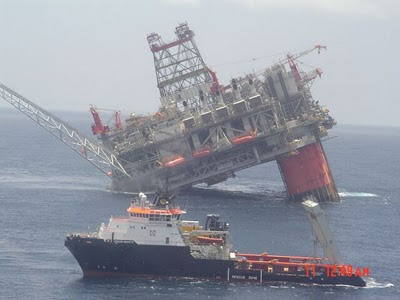This is a good time to link back to my post on Peak Oil. I have been listening to all sorts of people saying how we have to keep drilling so that we don't have pay more for oil. It is a great argument, other than the fact that it is not true.
Every time you hear the argument for drilling somehow linked to the price of oil, remember back a few months ago when I wrote the following: "We produce 7% of the world's oil, while consuming 24%. Simple economics say that we can have a lot more influence on price of oil by managing our demand rather than our production."
(Actually these stats show that we produce 5.8% of the world's oil, and consume 22.8%)
Oil prices are set on a global market, whether we drill in the gulf or not, it isn't going to affect the worldwide price of oil much. What we consume will tremendously affect the price of oil, and the Saudi's know it.
A better argument is that oil prices are currently too low. They don't price oil for externalities, such as national security, global climate change, and the risk of environmental disasters like the gulf oil spill. Including these costs in the price of oil would be a free market approach to reducing oil consumption.
Wednesday, June 16, 2010
Friday, June 11, 2010
New Blog
A crazy Colorado town has banned cycling.
I decided to write a blog about it.
Read more here at Boycott Blackhawk.
I decided to write a blog about it.
Read more here at Boycott Blackhawk.
Wednesday, June 9, 2010
Is Failure An Option?
I once heard former NASA Flight Director Gene Kranz speak about the Apollo 13 mission, in which he repeated his famous quote, "Failure Is Not An Option". For the last month and a half, our nation has been puzzled as to how BP could have failed so miserably to prevent the tragedy in the gulf that is still unfolding.
The backups designed to prevent this exact problem failed, and it appears that additional backups were deemed too costly. The best analysis on this subject that I have read comes from Kenneth G. Brill over at Forbes Magazine.
As you read his analysis, keep in mind what Brill is famous for. According to Brill's page at the University Of Redlands, "Brill is the founder and former executive director of the Uptime Institute and the Site Uptime Network, an organization that provides many opportunities and resources for the data center industry and data center professionals."
Basically, he has devoted his professional life to studying the why machines and organizations fail and how to prevent it. Brill, who has a degree in electrical engineering from the Redlands College of Arts and Sciences says that very few business even need to have a "never failing" approach to their activities, as the cost of creating such a system are incredibly high. Unfortunately, companies are designed to accept the possibility of failure, so long as the risk is low enough and the cost of preventing it is high enough so that, on average, the cost of failure is less than the cost of preventive measures. Simply put, from the standpoint of a corporation, failure will always be an option.
Subscribe to:
Comments (Atom)



